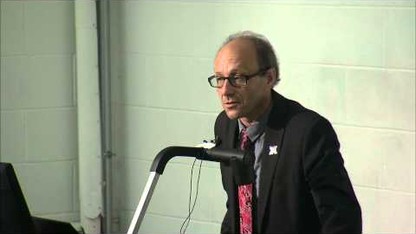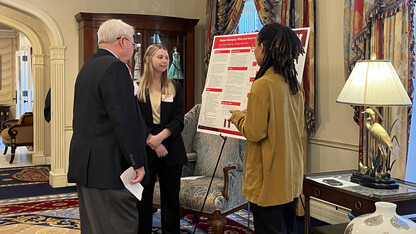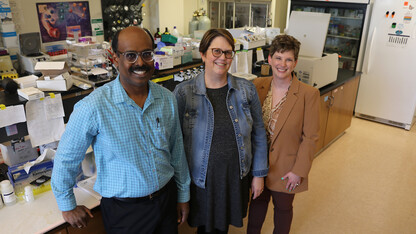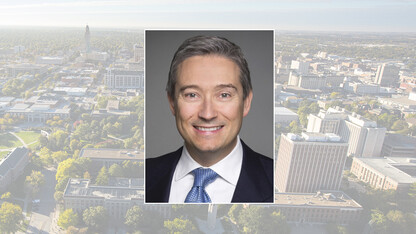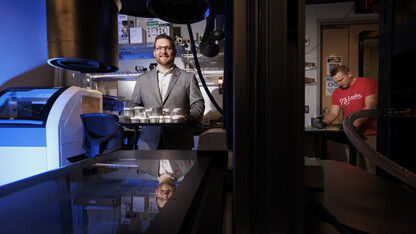· 6 min read
Achievements: Kebbel named to Fulbright Review Committee
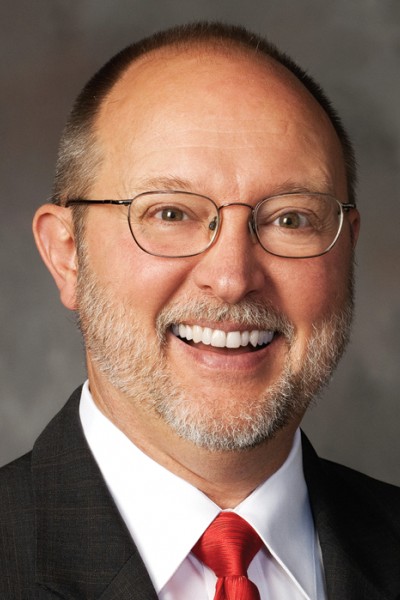
Gary Kebbel has been named a national reviewer of Fulbright applications for its Specialist Program. Kebbel is the first faculty member in the UNL College of Journalism and Mass Communications to join other media experts on the Communications and Journalism Peer Review Committee for Fulbright Specialists.
Kebbel has received two Fulbright Specialist grants. His most recent was in June to conduct training seminars in social and mobile media at the African Union in Ethiopia. He also has served as a Fulbright Specialist at Tshwane University of Technology in Pretoria, South Africa, helping its journalism department create a digital media curriculum.
“This is a significant recognition of Prof. Kebbel’s expertise,” said Dean Maria Marron from the college. “It is a wonderful accomplishment to be named to prestigious national review committees, and I am delighted to see that Gary has been invited to evaluate Fulbright Specialist proposals. The invitation speaks highly of the caliber of work done by faculty in our college.”
As a member of the review committee, Kebbel will help determine which proposals are awarded a Fulbright Specialist grant. According to its website, “The Fulbright Specialist Program promotes linkages between U.S. scholars and professionals and their counterparts at host institutions overseas. The program awards grants to qualified U.S. faculty and professionals, in select disciplines, to engage in short-term collaborative two- to six-week projects at eligible institutions in over 140 countries worldwide.”
Faculty
Marco Abel’s book “The Counter-Cinema of the Berlin School” recently won the German Studies Association’s 2014 Book Prize. The German Studies Association is the foremost body of German scholars in the United States. The award is given to the best book in the fields of German-language literature, Germanistik, or culture studies.
In the book, Abel, an associate professor of English and film studies and chair of the Department of English, examines the political role of a new wave of filmmakers in Germany and argues that the Berlin School films are a counter-cinema that depicts a German people that has not yet come to be.
“I argue that the filmmakers are actually taking account for the fact that, because of how unification was done, there is no constituted German people,” Abel said. “So they’re making, quite literally, films for a people that does not yet exist. The constitution that they have today is the constitution of West Germany, which continues to cause problems today, especially for East Germany. These films don’t thematize on this – there is no dramatization of that – but they are narratively and aesthetically organized as some sort of vision or attempt to appeal to some utopia, or a German people to come.”
The American Society of Engineering Education recently spotlighted Carl Nelson for his work as an associate professor of mechanical and materials engineering, choosing him as one of the “20 under 40” educators worth keeping an eye on.
In the September issue of its magazine Prism, ASEE honored Nelson and 19 other educators under 40 for what they have accomplished in their “demonstrated talent for teaching, real-world research, or – as is often the case – both.” The magazine said the selections were made based on recommendations by schools and colleagues and through research by the magazine’s staff. Nelson, in an article titled “Healing Ingenuity,” was chosen for his mentoring of students and for his work in refining medical technology.
Don Reynolds will become director of the School of Veterinary Medicine and Biomedical Sciences Nov. 1. He also will be associate dean of the College of Agricultural Sciences and Natural Resources for the Professional Program in Veterinary Medicine. He was dean of the Atlantic Veterinary College at the University of Prince Edward Island from 2008-2014 and has held administrative roles at Iowa State University.
Daniel Schachtman, agronomy and horticulture, became director of UNL’s Center for Biotechnology July 1. UNL’s Center for Biotechnology supports life sciences research campuswide. Its research core facilities provide services for microscopy, genome sequencing, bioinformatics, protein analysis, mass spectrometry and plant transformation. These core facilities are available to UNL scientists as well as others in academia, federal laboratories and the private sector.
NU Foundation
The University of Nebraska Foundation has named Connie Pejsar as the Hixson-Lied College’s new Director of Development. Pejsar has been with the foundation since 1983 and has held a variety of positions, including fundraising for the College of Architecture and State Museum.
“The most rewarding part of my job is establishing relationships with alumni and friends of the university and helping them make their dream of helping the university a reality,” Pejsar said. “I look forward to meeting the alumni and friends of the Hixson-Lied College and continuing that work.”
Effective May 1, Lucy Buntain Comine transitioned to a part-time status at the University of Nebraska Foundation, stepping down from her position as Senior Development Director for the Hixson-Lied College of Fine and Performing Arts. Buntain Comine continues her service with the Foundation working in major gift development and on special projects.
Departments
The Department of Chemistry hosted a colloquium event titled “Inaugural Nebraska Cluster for Computational Chemistry Award” on Sept. 19 in Hamilton Hall. Opening remarks were made by David B. Berkowitz, chair of UNL’s chemistry department, and Prem Paul, vice chancellor of research and economic development at UNL. [See video]
Following the remarks, a medallion presentation honored Eugene Cordes and Joseph Francisco. The event ended with an award lecture titled “Molecular Mesoscopics: Transport in Molecular Junctions.”
Students
Curtis Walker is one of seven UNL graduate students who began the new academic year as a National Science Foundation Graduate Research Fellow. The prestigious fellowship program provides three years of financial support for graduate study leading to a research-based master’s or doctoral degree. Students receive a yearly stipend as well as international research and professional development support.
A second-year fellow, Walker said that in addition to the financial benefits, the fellowship is allowing him to advance his research beyond what he could accomplish otherwise. While many graduate students must balance research and teaching, Walker concentrates solely on research. He also has access to the NSF-funded National Center for Atmospheric Research’s supercomputing resources, which has enabled him to expand his data-intensive research project.
Working with his adviser, Mark Anderson, associate professor of earth and atmospheric sciences, Walker is investigating ways to use cloud cover data to better forecast road conditions. Today’s road temperature models view clouds as either present or absent. “The problem is clouds don’t work like that,” Walker said. “We’re interested in those transition periods of increasing or decreasing cloud cover as well as types of clouds.”
This column is a regular feature of UNL Today. Faculty, staff and students can submit their achievements to be considered for this column via email to achievements@unl.edu. For more information, call 402-472-8515.
